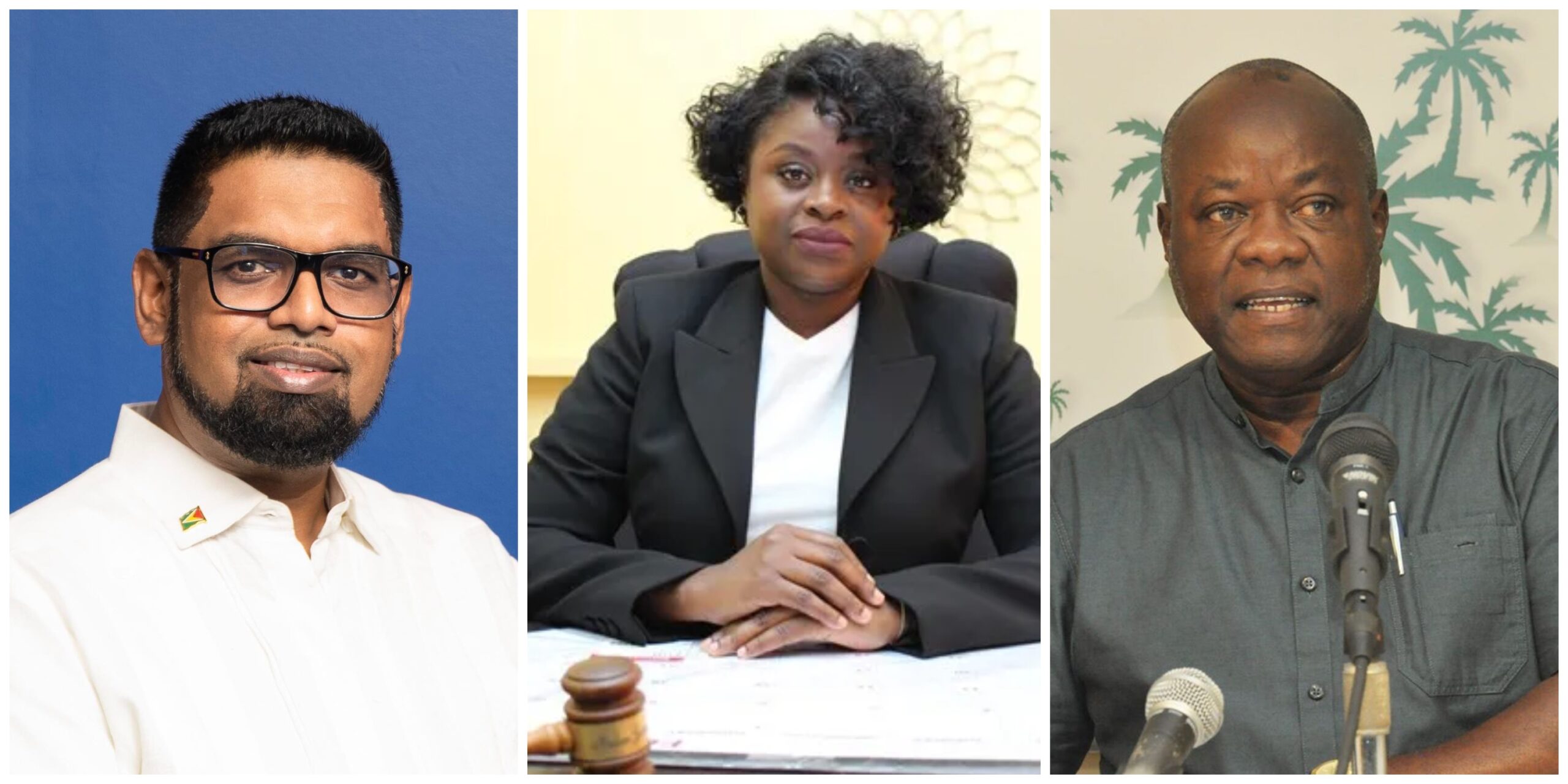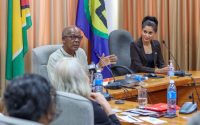No ‘dereliction of duty’ by Pres. Ali as way cleared for speedy appointment of Chancellor, Chief Justice
 Kurt@newsroom.gy
Kurt@newsroom.gy
High Court Judge, Damone Younge, on Wednesday called on President Dr. Irfaan Ali and Opposition Leader, Aubrey Norton to move with alacrity to ensure the speedy appointment of a substantive Chancellor and Chief Justice.
“No further delay and excuse will countenance,” Justice Younge said while pointing out that the Court has found no breach or gross dereliction of duty on the part of President Ali to appoint the two office holders.
The High Court Judge determined that there appeared an unwillingness on the part of former Opposition Leader, Joseph Harmon to consult with the President as is prescribed by Article 127 (1) of the constitution.
And it was only in April 2022, almost two years since Dr. Ali took up the presidency that a new Opposition Leader in the person of Aubrey Norton had expressed a willingness to meet about the appointments.
Weeks after a June 07, 2022 correspondence, a case challenging the ‘delay’ in appointing persons to these posts, was filed by Opposition Member of Parliament, Vinceroy Jordan.
The Judge observed that the Constitution imposes a mandatory obligation for the Opposition Leader and President to reach agreement on the individuals to be appointed substantively.
Justice Younge, in her ruling, said while the onus is on the President, one is also placed on the Leader of the Opposition.
“As we say, one hand cannot clap.”
 of the Judiciary, Yonette Cummings-Edwards and Chief Justice (ag), Roxane George</p>
<p>” data-medium-file=”https://newsroom.gy/wp-content/uploads/2018/06/Yonette-Cummings-Edwards-and-Roxanne-George-Wiltshire-300×169.jpg” data-large-file=”https://newsroom.gy/wp-content/uploads/2018/06/Yonette-Cummings-Edwards-and-Roxanne-George-Wiltshire-1024×576.jpg” decoding=”async” loading=”lazy” class=”size-large wp-image-48691″ alt=”” width=”1024″ height=”576″ srcset=”https://newsroom.gy/wp-content/uploads/2018/06/Yonette-Cummings-Edwards-and-Roxanne-George-Wiltshire-1024×576.jpg 1024w, https://newsroom.gy/wp-content/uploads/2018/06/Yonette-Cummings-Edwards-and-Roxanne-George-Wiltshire-300×169.jpg 300w, https://newsroom.gy/wp-content/uploads/2018/06/Yonette-Cummings-Edwards-and-Roxanne-George-Wiltshire-768×432.jpg 768w, https://newsroom.gy/wp-content/uploads/2018/06/Yonette-Cummings-Edwards-and-Roxanne-George-Wiltshire.jpg 1280w” sizes=”(max-width: 1024px) 100vw, 1024px”></a><figcaption class=) Chancellor (ag) of the Judiciary, Yonette Cummings-Edwards and Chief Justice (ag), Roxane George
Chancellor (ag) of the Judiciary, Yonette Cummings-Edwards and Chief Justice (ag), Roxane GeorgeJustice Younge pointed out however, that the Constitution imposes no timeline on the consultative process but noted that “in this court’s view, there is no better way to demonstrate the commitment but to act with alacrity.”
Justice Younge believes any further ‘delay’ would not be good for the otherwise impressive legal and judicial landscape of Guyana.
Guyana remains without a substantive Chancellor and Chief Justice because of a lack of consultation and consensus between the President and the Leader of the Opposition.
This has been the case during the last three presidencies in Guyana after a constitutional amendment was made to allow the two top judicial office holders to be appointed substantively by the President after obtaining the agreement of the Opposition Leader.
Attorney General, Anil Nandlall, SC, previously noted that the formula has failed and should form part of changes to be made when Guyana undergoes the long-promised constitutional reform in the near future.
 100vw, 1024px”></a><figcaption class=) Attorney General Anil Nandlall; fformer Opposition Leader Joseph Harmon
Attorney General Anil Nandlall; fformer Opposition Leader Joseph HarmonSince the amendment was made to the constitution in 2001, no Chancellor or Chief Justice has been confirmed in the position.
Currently, Justice Yonette Cummings-Edwards is performing the duties of Chancellor and Justice Roxane George is performing the duties of the Chief Justice.
They were both appointed by former President David Granger in 2017. Failure by the former Opposition Leader Harmon to recognise President Irfaan Ali as legitimately elected, prevented any form of consultation between the two.
But even during the Granger presidency, no consultations occurred between him and the then Leader of the Opposition, Dr Bharrat Jagdeo.
Former Chancellor Carl Singh and Chief Justice Ian Chang both acted in the position for years amid failed attempts by former Presidents Donald Ramotar and Granger to reach a consensus on confirming them.
Guyana’s last substantive Chancellor of the Judiciary was Justice Desiree Bernard; she served until 2005 and was in position before the constitution was amended.
The procedures for the appointment of Chancellor and Chief Justice are outlined in Articles 127 (1) and (2) of the Constitution of Guyana.
Article 127 (1) states: “The Chancellor and the Chief Justice shall be appointed by the President after obtaining the agreement of the Leader of the Opposition.”


